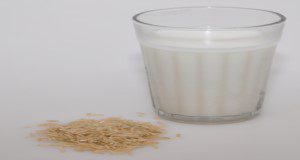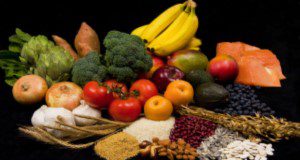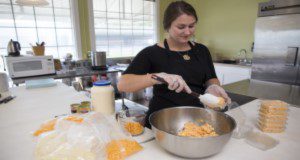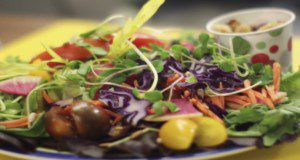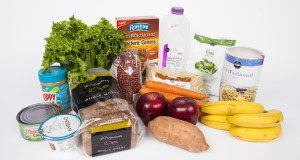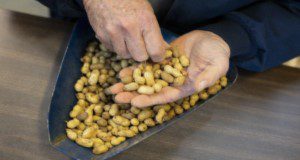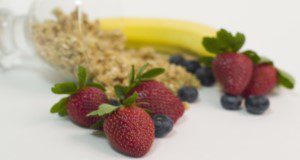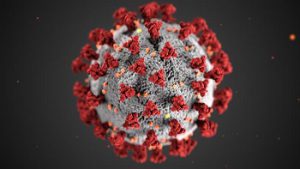Almond milk, a plant-based milk alternative, is produced from almonds and water. Almond milk originated from the Mediterranean region and has been consumed for many years. In the United States, there are several marketed brands of almond milk. This new 3-page publication of the UF/IFAS Food Science and Human Nutrition Department describes the nutrient profile and potential health benefits and risks of almond milk. Written by Elena Torna, Daniela Rivero Mendoza, and Wendy J. Dahl.
https://edis.ifas.ufl.edu/fs410
Category: Families & Consumers
Plant-Based Milks: Rice
Rice milk is a plant-based, nondairy beverage made primarily from milled rice and water. It is marketed as an allergy-friendly, easy-to-digest, vegan substitute for cow’s milk. Similar to other plant-based beverages, rice milk usually has an opaque white or beige color and creamy texture resembling that of cow’s milk. This new 4-page publication of the UF/IFAS Food Science and Human Nutrition Department describes how rice milk is made, its ingredients and nutrient profile, and potential health benefits and risks of consumption. Written by Meagan Lamothe, Daniela Rivero-Mendoza, and Wendy J. Dahl.
https://edis.ifas.ufl.edu/fs412
Reducing Your Risk for Arthritis: The Power of Food
Arthritis is the swelling or tenderness of the joints, and one in four adults within the United States have been diagnosed with some type of it. Arthritis can happen because of genetics and aging, but other factors, such as diet and lifestyle, may contribute to it. This new 5-page publication of the UF/IFAS Food Science and Human Nutrition Department describes the modifiable factors contributing to arthritis and tips to reduce risk for arthritis. It also includes some relevant recipe ideas. Written by Sarah Curl, Jodi Fitzgerald, Danielle Nelson, and Jeanette Andrade.
https://edis.ifas.ufl.edu/fs398
Nutrition for Health and Fitness: Sugar and Other Sweeteners
This new 8-page publication of the UF/IFAS Food Science and Human Nutrition Department provides information about sugars and other sweeteners in the American diet. It describes hidden sources of added sugars in foods to help those who want to reduce sugar intake find the added sugars in their diets. The section on high-intensity sweeteners looks at the characteristics of each approved sweetener, including aspartame, sucralose, and stevia. Written by Linda Bobroff.
https://edis.ifas.ufl.edu/fs406
A Guide to Carbonating Beverages at Small Scale
The objective of this new 5-page guide is to provide information on how to successfully carbonate beverages on a small scale. Included is information on the benefits of carbonation, common carbonation levels, pros and cons of different carbonation methods, standard procedures to achieve a specific carbonation level, and economic considerations for manufacturers. Written by Xuwei Song, Nicholas Wendrick, Charles A. Sims, and Andrew MacIntosh, and published by the UF/IFAS Food Science and Human Nutrition Department.
https://edis.ifas.ufl.edu/fs379
An Introduction to Shared-Use Commercial Kitchens
Shared-use commercial kitchens are commonly used by food entrepreneurs to launch new food products into market; however, there remain questions about how these facilities work. This new 4-page document defines basic terms used to describe shared-use commercial kitchens, such as incubator, accelerator, or food hub, and gives an overview of potential services or resources available at these facilities. Furthermore, basic information on state level food regulations and an extensive list of shared-use commercial kitchens in Florida is included. Written by Matthew Krug and Sarah Ellis and published by the UF/IFAS Food Science and Human Nutrition Department.
https://edis.ifas.ufl.edu/fs400
Popular Diets: Intermittent Fasting
Weight loss can be challenging. Starting a restrictive diet can be emotionally draining and difficult to adhere to. Is there a more effective way to lose weight? Does the timing and frequency of meals help to lose weight? This new 4-page publication of the UF/IFAS Food Science and Human Nutrition Department describes the benefits and risks of intermittent fasting for weight loss. Written by Michelle Yavelow, Daniela Rivero Mendoza, and Wendy Dahl.
https://edis.ifas.ufl.edu/fs409
Dieta e inflamación crónica
La inflamación es la respuesta de su cuerpo a las lesiones e infecciones—así es como su sistema inmunológico ayuda a protegerlo de cualquier daño. Por el contrario, la inflamación crónica contribuye a muchas enfermedades, como enfermedades cardíacas, diabetes y enfermedades renales y hepáticas. Esta publicación discute la inflamación y las opciones alimentarias que pueden ayudar a reducir la inflamación crónica.
This is the Spanish translation of FSHN20-43, Diet and Chronic Inflammation. Written by Daniela Rivero-Mendoza and Wendy Dahl, translated by Daniela Rivero-Mendoza, and published by the UF/IFAS Food Science and Human Nutrition Department.
https://edis.ifas.ufl.edu/fs405
Diet and Chronic Inflammation
Inflammation is your body’s response to injury and infection—it’s how your immune system helps to protect you from harm. In contrast, chronic inflammation contributes to many diseases, including heart disease, diabetes, and kidney and liver disease. This new 4-page publication of the UF/IFAS Food Science and Human Nutrition Department discusses inflammation and the dietary choices that may help to reduce chronic inflammation. Written by Daniela Rivero-Mendoza and Wendy Dahl.
https://edis.ifas.ufl.edu/fs402
Weight Loss and the Older Adult: Risks and Benefits
Adults who are obese are often advised to lose weight to reduce the risk of chronic disease. However, the health benefits of weight loss change as we become older, and unintentional weight loss is linked to its own set of health risks. This new 3-page publication of the UF/IFAS Food Science and Human Nutrition Department discusses the risks and benefits of planned and unplanned weight loss for older adults. Written by Wendy Gans, Rachelle Savelle, Nancy J. Gal, and Wendy Dahl.
https://edis.ifas.ufl.edu/fs401
Popular Diets: Raw Foods
The raw foods diet has its roots in a vegetarian movement dating back to the 1800s. As the name implies, a raw foods diet is a dietary pattern composed of mostly or completely raw, unprocessed foods. This new 3-page publication of the UF/IFAS Food Science and Human Nutrition Department explores the potential health benefits and risks of a raw foods diet. Written by Alexa Barad, Daniela Rivero-Mendoza, and Wendy Dahl.
https://edis.ifas.ufl.edu/fs404
Popular Diets: Ketogenic Diet
The ketogenic diet is a high-fat, very low carbohydrate diet. The first documented use of the ketogenic diet was in 1921 to treat epilepsy in children. In the past few years, the ketogenic diet has resurged in popularity as a potential means for weight loss. The ketogenic diet has become popular due to celebrity endorsement and social media influences. This new 4-page publication of the UF/IFAS Food Science and Human Nutrition Department explains the concepts behind this diet, explores the available menu, and examines whether this diet is safe and effective. Written by Kelsey Gemmill, Daniela Rivero-Mendoza, and Wendy Dahl.
https://edis.ifas.ufl.edu/fs403
Wastewater and Septic System Management for the COVID-19 Virus: Frequently Asked Questions
This new 3-page publication of the UF/IFAS Department of Soil and Water Sciences answers common questions about the potential role of wastewater and septic systems in transmission of COVID-19. It is intended as guidance for the general public. Written by Mary G. Lusk.
https://edis.ifas.ufl.edu/ss692
Reducing Your Risk for Cancer: The Power of Food
Cancer is the #2 cause of death within the United States, where 2 out of every 5 people will be diagnosed with some form of cancer within their lifetime. Forty-five percent of cancer deaths may have been caused by risk that factors that you can change, such as weight, diet, and lifestyle. This new 6-page publication describes the modifiable risk factors for cancer and tips to reduce your risk for cancer. Written by Jodi Fitzgerald, Danielle Nelson, Madison Woodard, and Jeanette Andrade, and published by the UF/IFAS Food Science and Human Nutrition Department.
https://edis.ifas.ufl.edu/fs392
Strategies to Increase Personal Resilience in Disaster Response Efforts
This 3-page publication highlights strategies to help Extension professionals increase their personal resilience in disaster response efforts. Written by Amanda D. Ali, Angela Lindsey, Amy Harder, Lisa Lundy, and T. Grady Roberts, and published by the UF/IFAS Department of Agricultural Education and Communication, May 2020.
https://edis.ifas.ufl.edu/wc360
Don't Fake It, Make It! Thriving in Virtual Conferences and Meetings
Our ways of working, meeting, and networking have become more virtual than ever before. This series dives into the preparation needed to host a successful virtual experience, as well as steps participants can take to get the most benefit from a virtual conference or meeting. This series will also help hosts understand the value of online conferences and meetings and demonstrate how to create engagement in an online format. This new 4-page publication of the UF/IFAS Department of Agricultural Education and Communication, the first in the series, was written by Lauri M. Baker, Matt P. Benge, Anissa Zagonel, Jarred Shellhouse, Cheryl R. Boyer, and Phillip Stokes.
https://edis.ifas.ufl.edu/wc365
COAST: A Comprehensive Older-Adult Screening Tool
Nutrition risk screening is a first step to quickly identify individuals who might be malnourished or at risk of malnutrition. A malnutrition screening tool should be easy to use, quick to administer, and valid—able to correctly identify those at risk of malnutrition. The Comprehensive Older Adult Screening Tool (COAST) is a valid and practical tool to determine if community-dwelling older adults, specifically older adults of lower socioeconomic status, are at risk for malnutrition. This new 6-page publication of the UF/IFAS Food Science and Human Nutrition Department, written by Karima Alabasi, Nancy J. Gal, and Wendy J. Dahl, provides an introduction to COAST as well as the 5-question screening tool.
https://edis.ifas.ufl.edu/fs393
COAST-ES: Herramienta integral de tamizaje para adultos mayores
El tamizaje (cribado) del riesgo nutricional es un primer paso para identificar rápidamente a las personas que pueden estar desnutridas o en riesgo de desnutrición. Una herramienta de tamizaje de detección de desnutrición debe ser fácil de usar, rápida de administrar y válida para poder identificar correctamente a las personas en riesgo de desnutrición. La Herramienta Integral de Tamizaje de Adultos Mayores (COAST, por sus siglas en inglés) es una herramienta váida y práctica para determinar si los adultos mayores que viven en la comunidad están en riesgo de desnutrición.
This is the Spanish translation of FSHN20-37/FS393, COAST: A Comprehensive Older-Adult Screening Tool. Written by Karima Alabasi, Nancy J. Gal, and Wendy J. Dahl, translated by Daniela Rivero Mendoza, and published by the UF/IFAS Food Science and Human Nutrition Department.
https://edis.ifas.ufl.edu/fs396
COVID-19 and Food Safety FAQ: Is Coronavirus a Concern at Grocery Stores? (Mandarin Chinese)
This is the Mandarin Chinese translation of FSHN20-20/FS348, COVID-19 and Food Safety FAQ: Is Coronavirus a Concern at Grocery Stores? It provides answers to a few frequently asked questions regarding COVID-19 and grocery stores. Written by Natalie Seymour, Mary Yavelak, Candice Christian, and Ben Chapman, and published by the UF/IFAS Food Science and Human Nutrition Department.
https://edis.ifas.ufl.edu/fs391
Is Coronavirus a Concern on Fresh Produce? (Mandarin Chinese)
This is the Mandarin Chinese translation of FSHN20-22/FS350, Is Coronavirus a Concern on Fresh Produce? It provides guidance relevant to COVID-19 regarding handling and consumption of fresh produce. Written by Natalie Seymour, Mary Yavelak, Candice Christian, and Ben Chapman, and published by the UF/IFAS Food Science and Human Nutrition Department.
https://edis.ifas.ufl.edu/fs389

